Search Results
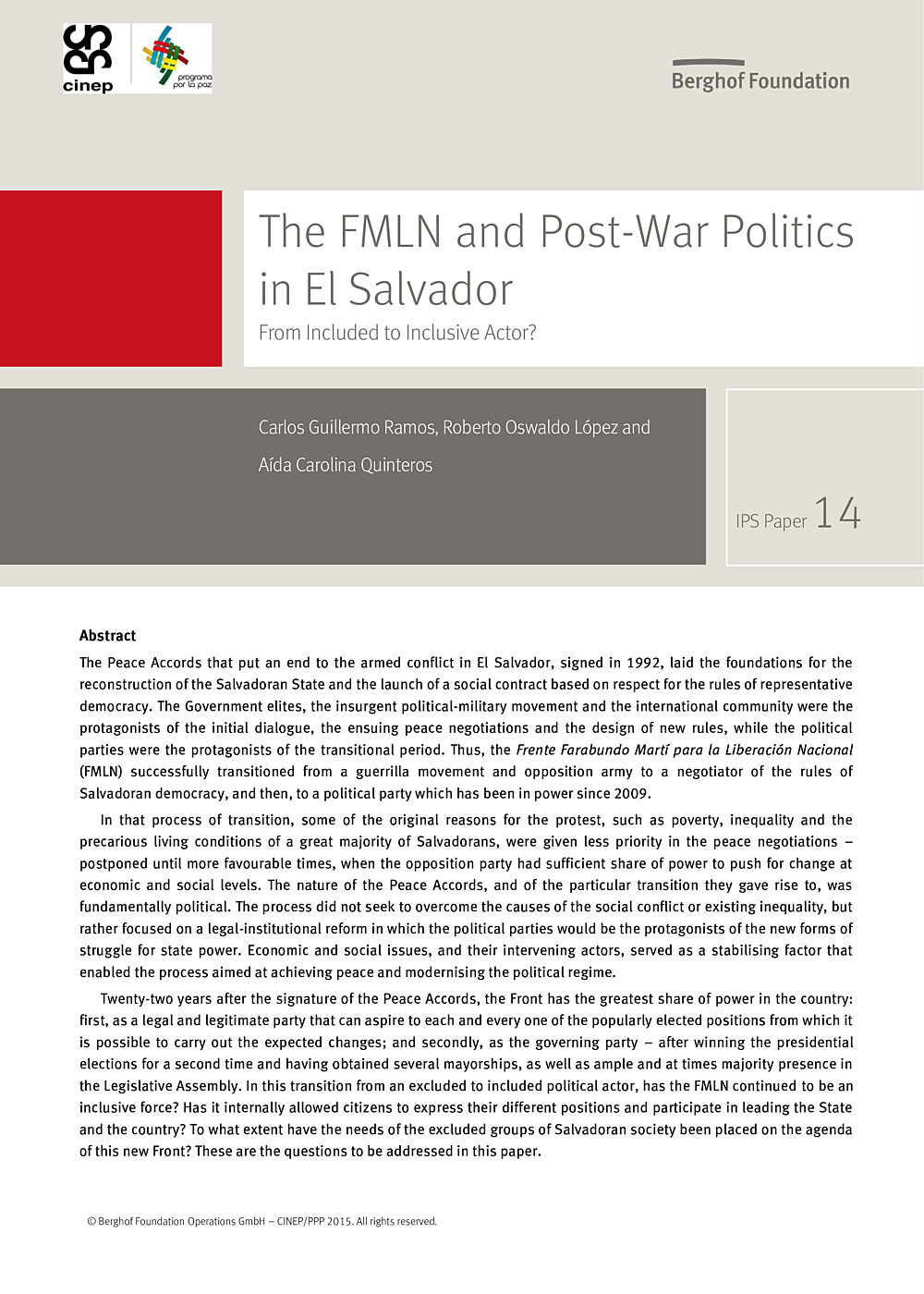
The FMLN and Post-War Politics in El Salvador: From Included to Inclusive Actor?IPS Paper No. 14
Twenty-two years after the signature of the Peace Accords, the Front has the greatest share of power in the country: first, as a legal and legitimate party that can aspire to each and every one of the popularly elected positions from which it is possible to carry out the expected changes; and secondly, as the governing party – after winning the presidential elections for a second time and having obtained several mayorships, as well as ample and at times majority presence in the Legislative Assembly.
- Year 2015
- Author(s) Carlos Guillermo Ramos, Roberto Oswaldo López, Aída Carolina Quinteros
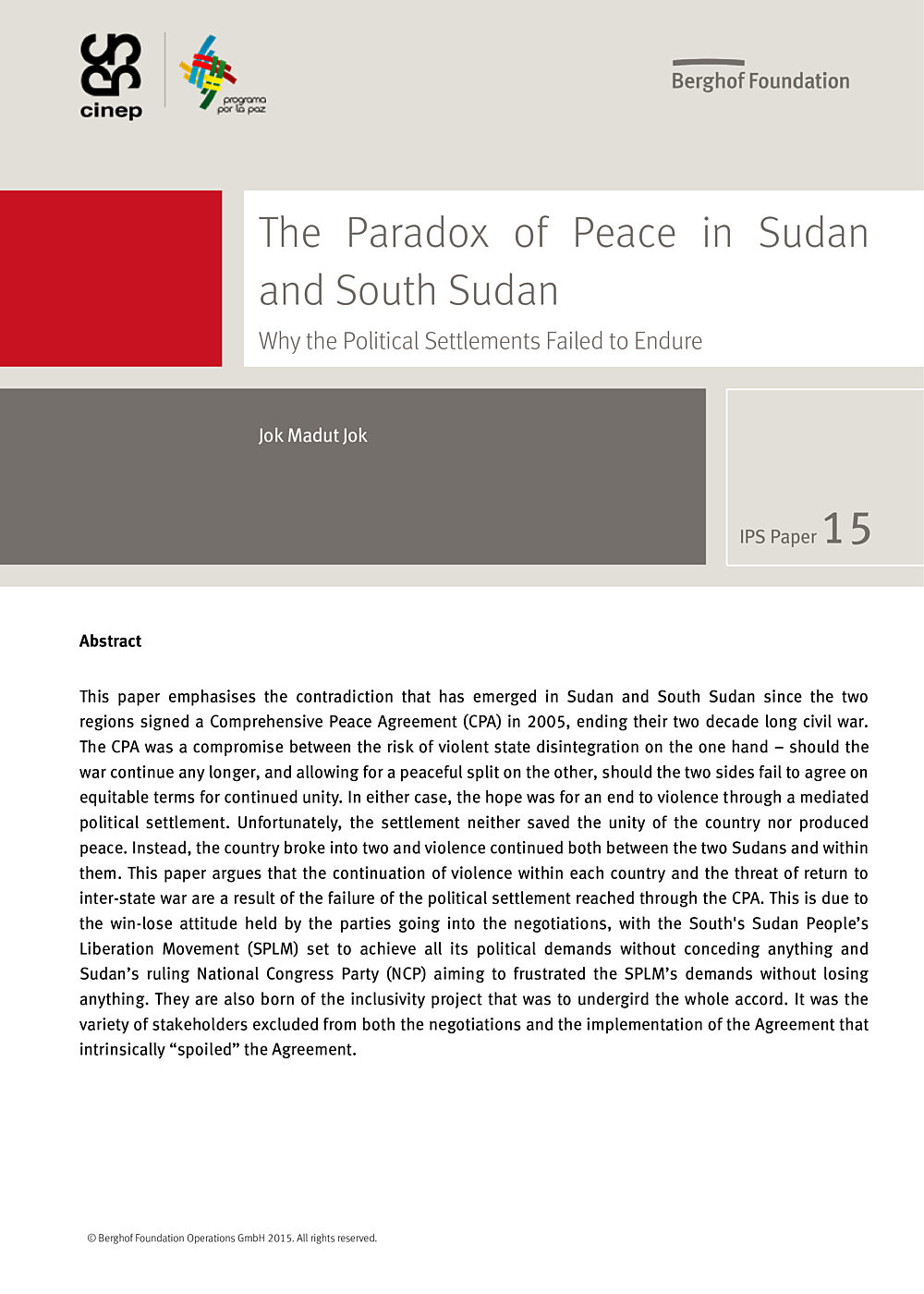
The Paradox of Peace in Sudan and South Sudan: Why the Political Settlements Failed to EndureIPS Paper No. 15
This paper emphasises the contradiction that has emerged in Sudan and South Sudan since the two regions signed a Comprehensive Peace Agreement (CPA) in 2005, ending their two decade long civil war. The CPA was a compromise between the risk of violent state disintegration on the one hand –should the war continue any longer, and allowing for a peaceful split on the other, should the two sides fail to agree on equitable terms for continued unity. In either case, the hope was for an end to violence through a mediated political settlement. Unfortunately, the settlement neither saved the unity of the country nor produced peace. Instead, the country broke into two and violence continued both between the two Sudans and within them.
- Year 2015
- Author(s) Jok Madut Jok
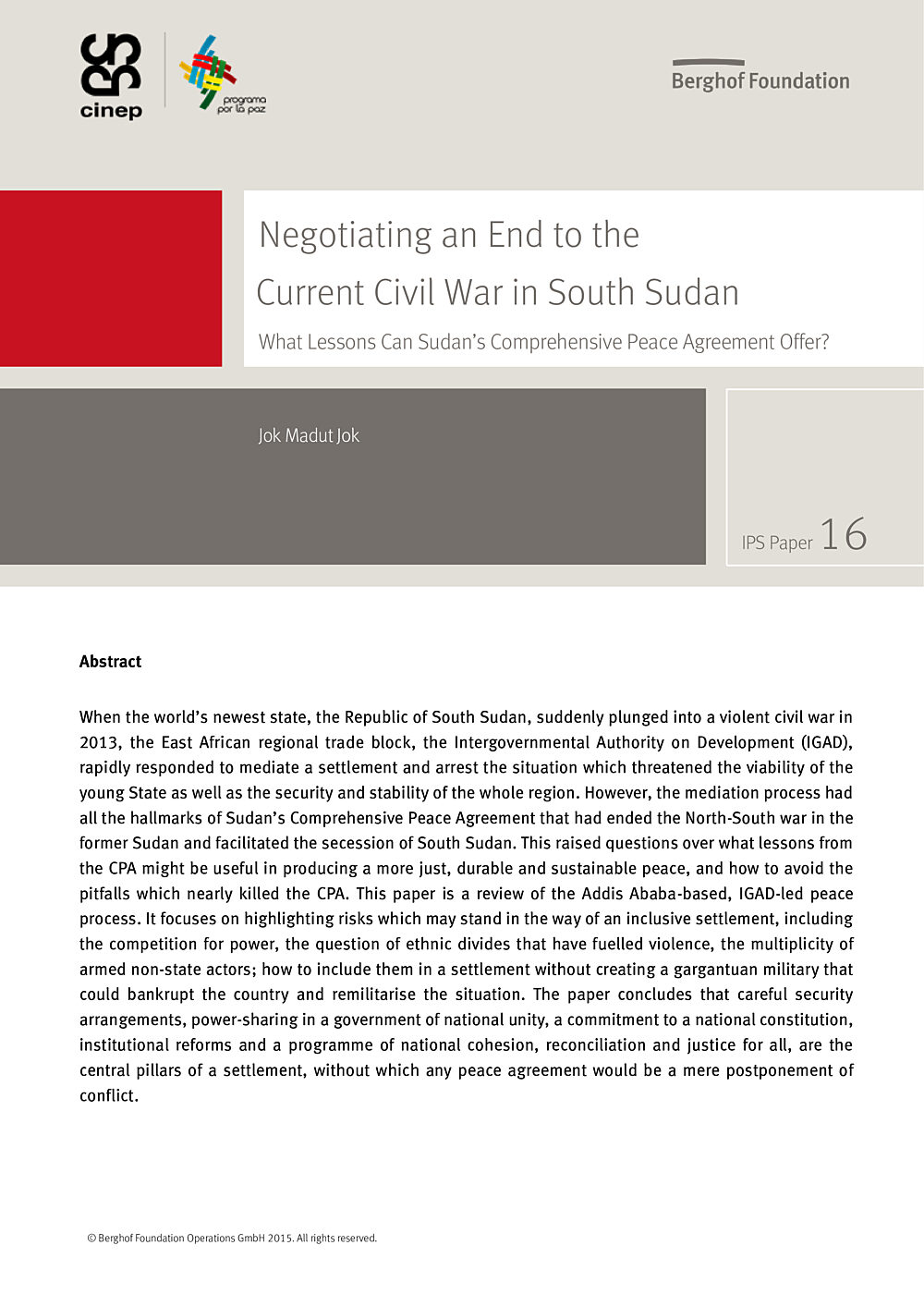
Negotiating an End to the Current Civil War in South Sudan: What Lessons Can Sudan’s Comprehensive Peace Agreement Offer?IPS Paper No. 16
This paper is a review of the Addis Ababa-based, IGAD-led peace process. It focuses on highlighting risks which may stand in the way of an inclusive settlement, including the competition for power, the question of ethnic divides that have fueled violence, the multiplicity of armed non-state actors; how to include them in a settlement without creating a gargantuan military that could bankrupt the country and remilitarise the situation. The paper concludes that careful security arrangements, power-sharing in a government of national unity, a commitment to a national constitution, institutional reforms and a programme of national cohesion, reconciliation and justice for all, are the central pillars of a settlement, without which any peace agreement would be a mere postponement of conflict.
- Year 2015
- Author(s) Jok Madut Jok
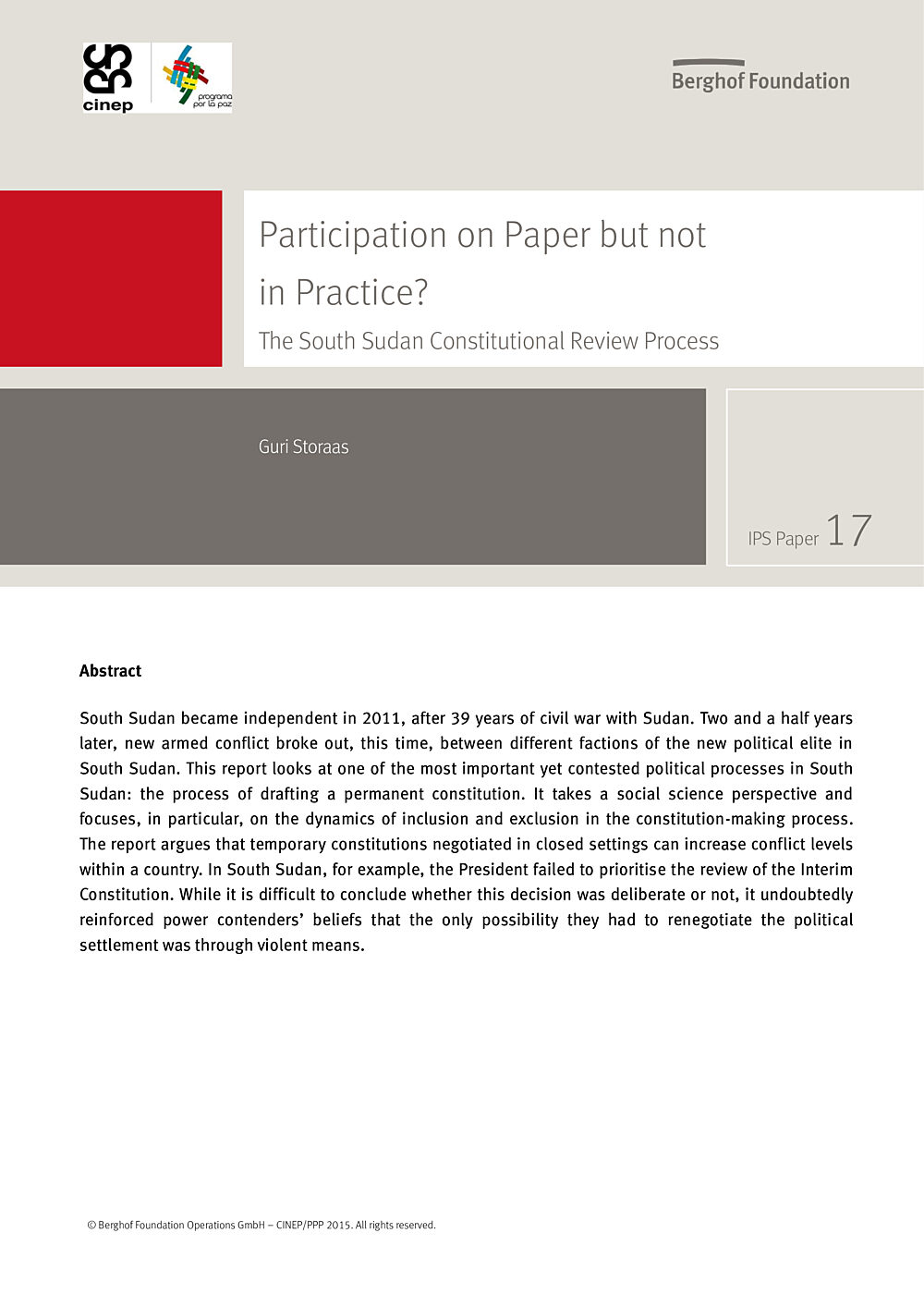
Participation on Paper but not in Practice? The South Sudan Constitutional Review ProcessIPS Paper No. 17
This report looks at one of the most important yet contested political processes in South Sudan: the process of drafting a permanent constitution. It takes a social science perspective and focuses, in particular, on the dynamics of inclusion and exclusion in the constitution-making process. The report argues that temporary constitutions negotiated in closed settings can increase conflict levels within a country.
- Year 2015
- Author(s) Guri Storaas
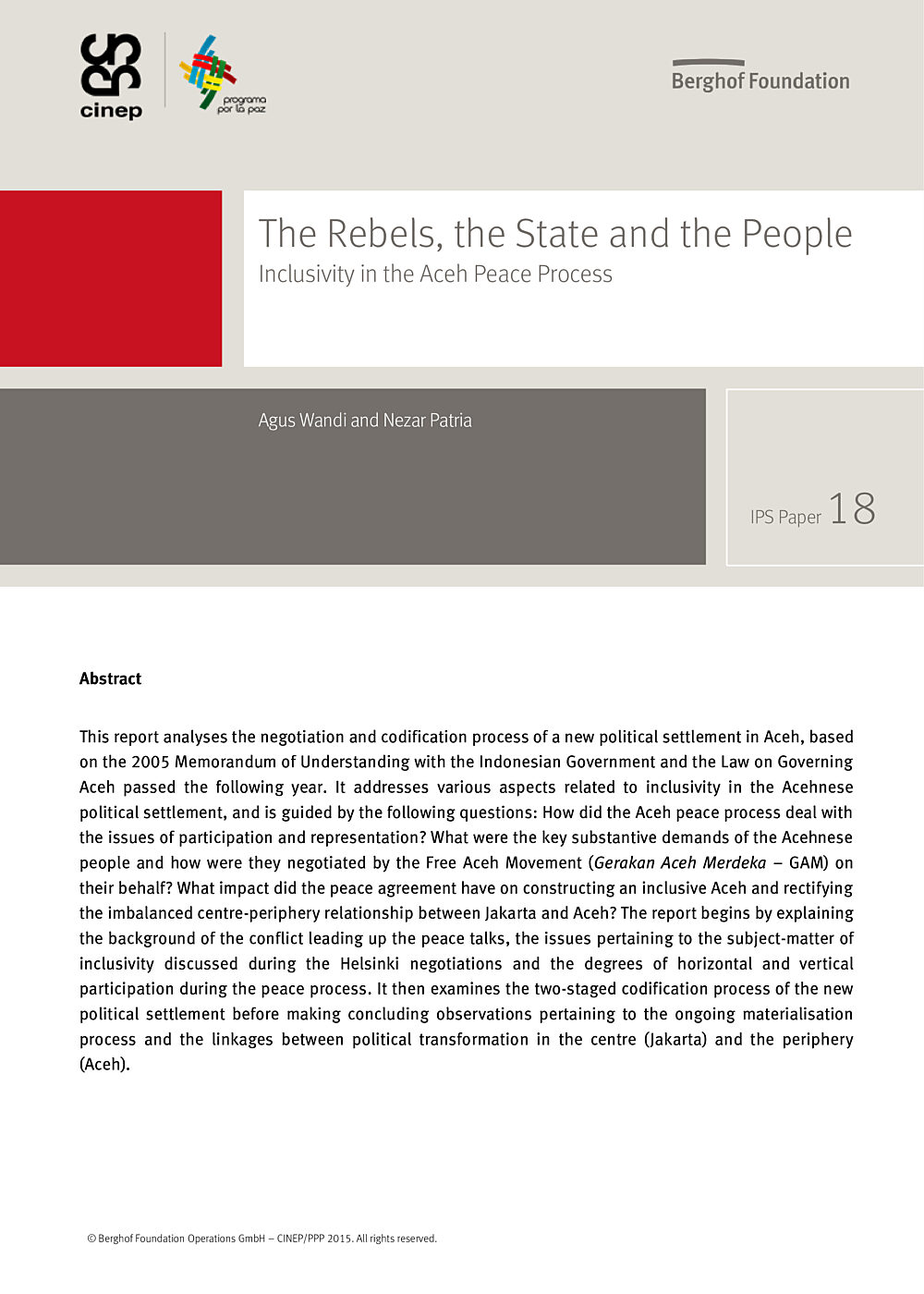
The Rebels, the State and the People: Inclusivity in the Aceh Peace ProcessIPS Paper No. 18
This report analyses the negotiation and codification process of a new political settlement in Aceh, based on the 2005 Memorandum of Understanding with the Indonesian Government and the Law on Governing Aceh passed the following year. It addresses various aspects related to inclusivity in the Acehnese political settlement, and is guided by the following questions: How did the Aceh peace process deal with the issues of participation and representation? What were the key substantive demands of the Acehnese people and how were they negotiated by the Free Aceh Movement (Gerakan Aceh Merdeka – GAM) on their behalf? What impact did the peace agreement have on constructing an inclusive Aceh and rectifying the imbalanced centre-periphery relationship between Jakarta and Aceh?
- Year 2015
- Author(s) Agus Wandi, Nezar Patria
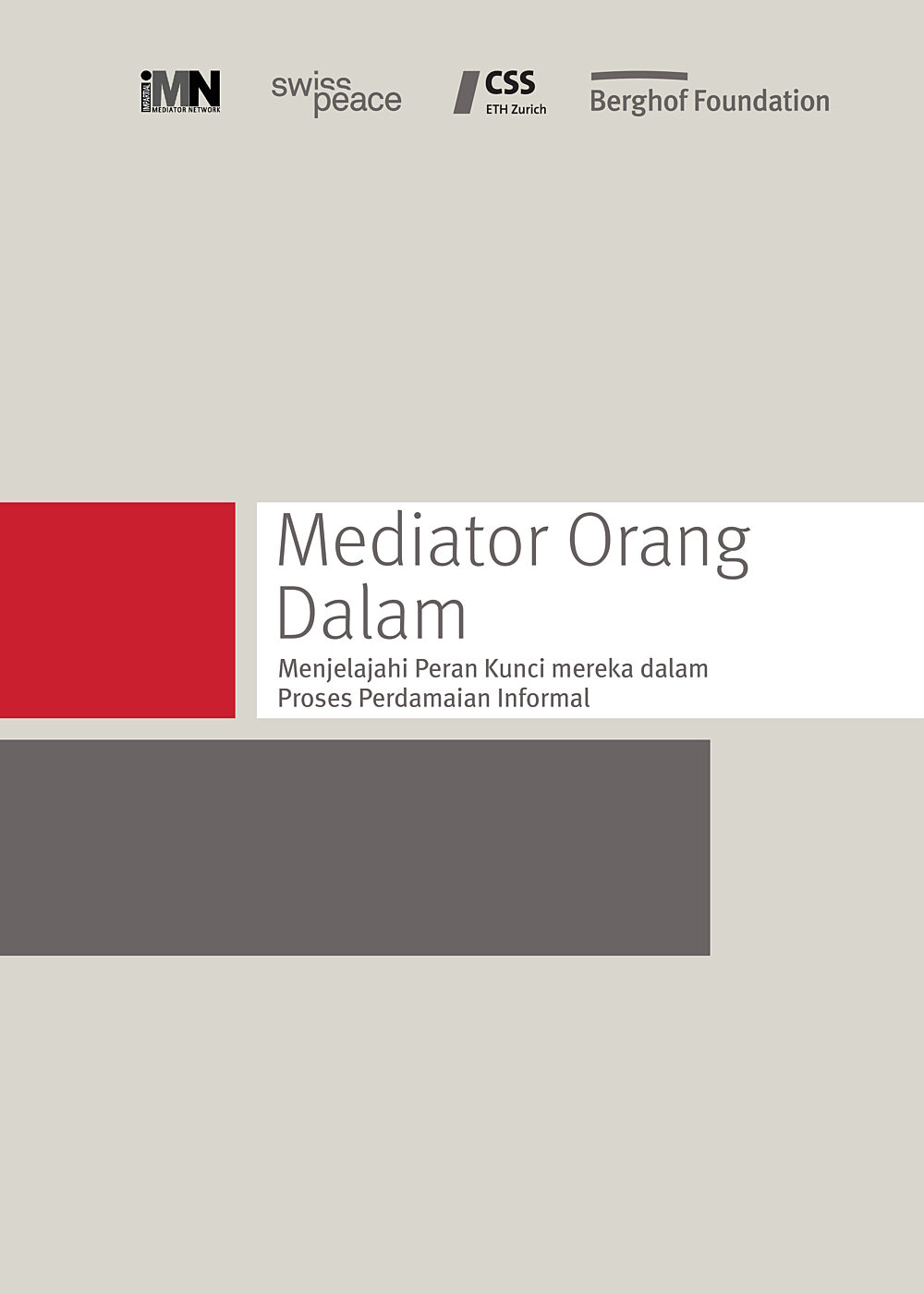
Mediator Orang DalamMenjelajahi Peran Kunci mereka dalam Proses Perdamaian Informal
Laporan ini menyoroti salah satu pelaku kunci dalam proses perdamaian: mediator orang dalam. Dasar laporan ini adalah pengalaman bahwa sebagian besar proses perdamaian resmi dimulai atau dilengkapi oleh proses informal, yang kerap difasilitasi oleh orang-orang dari daerah konflik, yang memiliki pengetahuan mendalam dan dedikasi besar untuk menyelesaikan konflik.
Untuk mengeksplorasi peran spesifik, potensi dan batasan mediator “orang dalam” lokal dan regional dalam proses perdamaian saat ini, Berghof Foundation for Peace Support (BPS) bekerja sama dengan Mediation Support Project dari Swisspeace/CSS-ETH Zurich mengundang belasan mediator orang dalam dari berbagai bagian dunia (Algeria, Burundi, Kongo, Jerman, Kenya, Kyrgyzstan, Makedonia, Mali, Meksiko, Nepal, Filipina, Sri Lanka, Swiss dan Uganda).
- Year 2016
- Author(s) Simon Mason
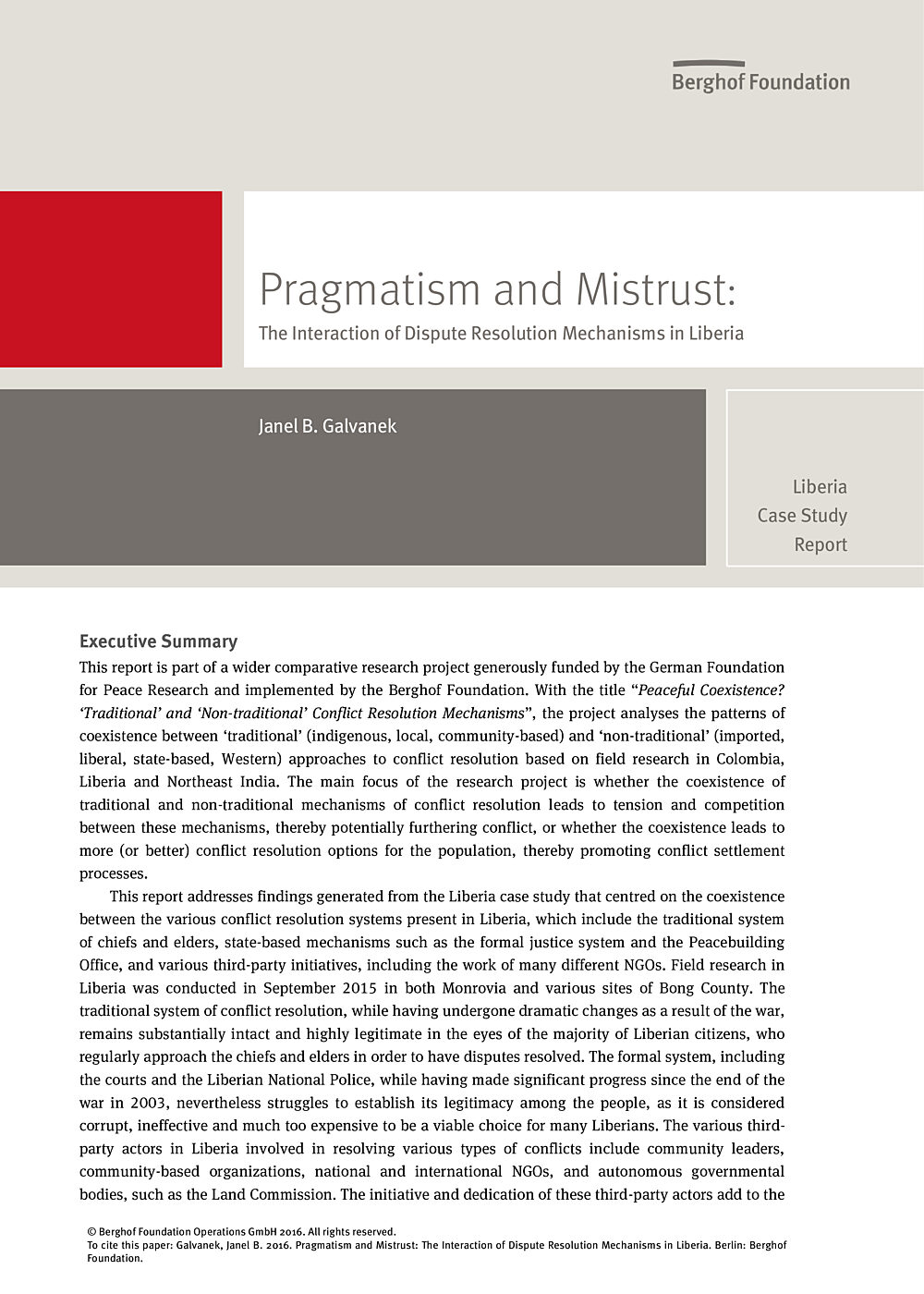
Pragmatism and MistrustThe Interaction of Dispute Resolution Mechanisms in Liberia (Case Study)
This report addresses findings generated from the Liberia case study on the coexistence of various conflict resolution systems in Liberia. Besides the traditional system of chiefs and elders, there are state-based mechanisms such as the formal justice system and the Peacebuilding Office, and various third-party initiatives, including the work of many different NGOs.
The study comes to the conclusion that the interaction and even cooperation of conflict resolution mechanisms in Liberia is happening on a massive scale, and provides recommendations on how this cooperation could be significantly improved.
- Year 2016
- Author(s) Janel B. Galvanek
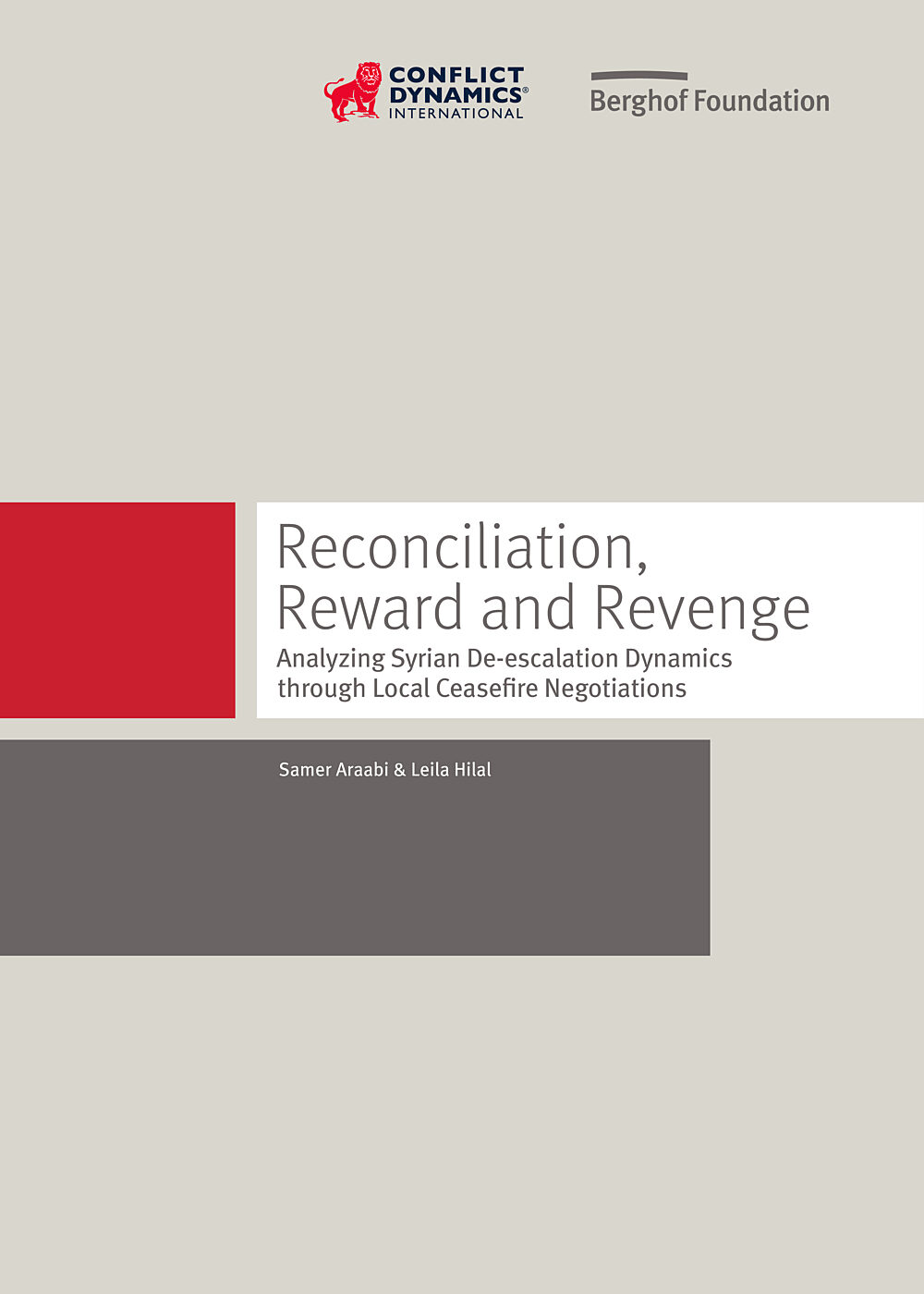
Reconciliation, Reward, and RevengeAnalyzing Syrian De-Escalation Dynamics through Local Ceasefire Negotiations (Berghof Grantee Publication)
Samer Araabi’s and Leila Hilal’s innovative report focuses on one prominent framework for local mediation and de-escalation in Syria: local ceasefire negotiations. Based on research conducted between mid-2014 and March 2016, their report presents four in-depth cases of ceasefire negotiations that have taken place inside Syria since 2012. It explains the environment in which these negotiations occurred and offers observations on the obstacles and shortcomings they faced.
- Year 2016
- Author(s) Samer Araabi, Leila Hilal
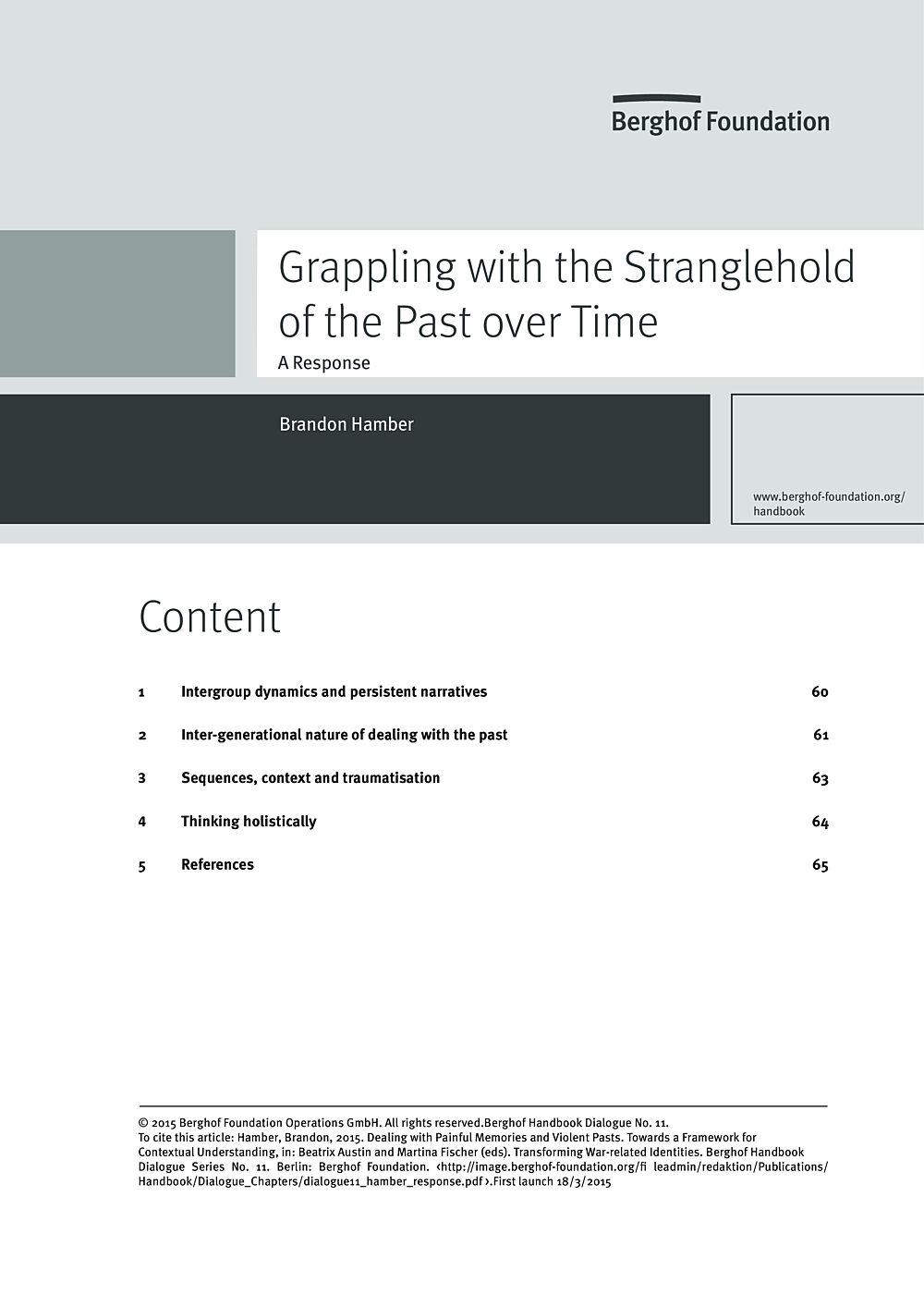
Grappling with the Stranglehold of the Past over Time: A ResponseBerghof Handbook Dialogue Series No. 11 - final reflection
I cannot do justice to the rich and thoughtful comments on my essay “Dealing with Painful Memories and Violent Pasts: Towards a Framework for Contextual Understanding” in this short response. The respondents who so graciously shared their thoughts have provided much to consider; I can only touch on the implications. I will not dwell on the commonalities in the approaches put forward by the commentators and myself, but rather focus on the divergences or elaborations posed by their insightful comments.
- Year 2016
- Author(s) Brandon Hamber
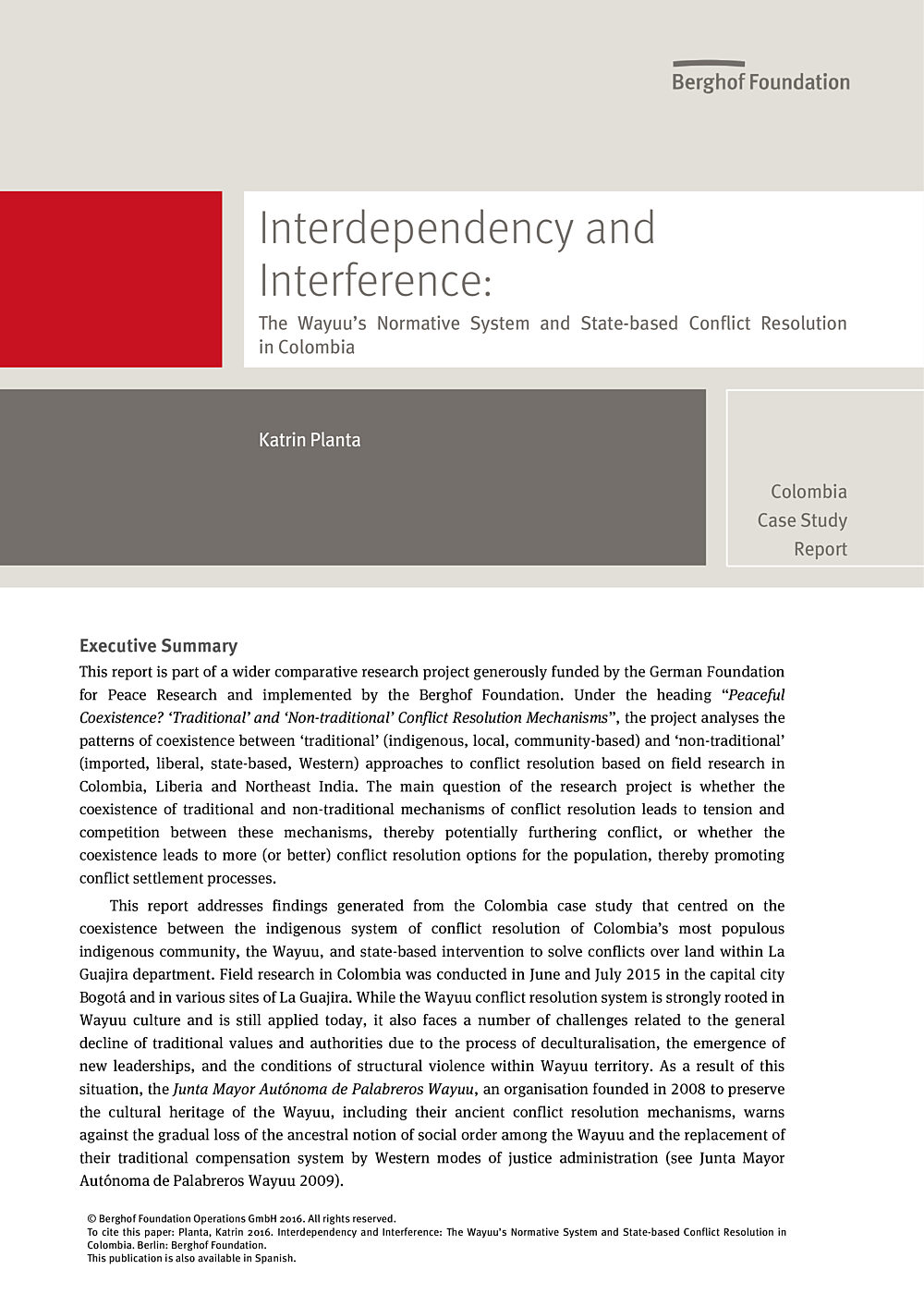
Interdependency and InterferenceThe Wayuu’s Normative System and State-based Conflict Resolution in Colombia (Case Study)
This report is part of a wider comparative research project on “Peaceful Coexistence? ‘Traditional’ and ‘Non-traditional’ Conflict Resolution Mechanisms” to analyze the patterns of coexistence between ‘traditional’ (indigenous, local, community-based) and ‘non-traditional’ (imported, liberal, state-based, Western) approaches to conflict resolution. It addresses findings on the coexistence between the indigenous system of conflict resolution of Colombia’s most populous indigenous community, the Wayuu, and state-based intervention to solve conflicts over land within La Guajira department.
- Year 2016
- Author(s) Katrin Planta